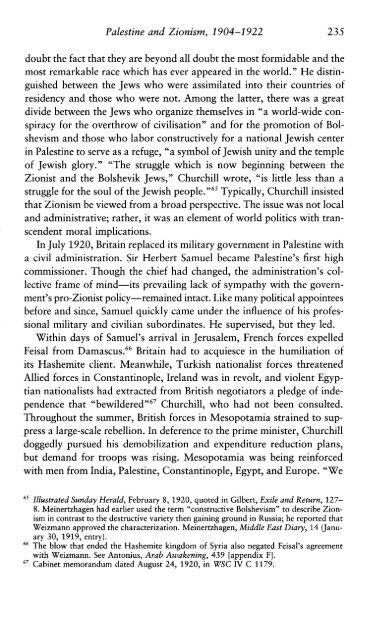Churchill, Palestine and Zionism, 1904-1922 - Douglas J. Feith
Churchill, Palestine and Zionism, 1904-1922 - Douglas J. Feith
Churchill, Palestine and Zionism, 1904-1922 - Douglas J. Feith
You also want an ePaper? Increase the reach of your titles
YUMPU automatically turns print PDFs into web optimized ePapers that Google loves.
<strong>Palestine</strong> <strong>and</strong> <strong>Zionism</strong>, <strong>1904</strong>-<strong>1922</strong> 235<br />
doubt the fact that they are beyond all doubt the most formidable <strong>and</strong> the<br />
most remarkable race which has ever appeared in the world." He distinguished<br />
between the Jews who were assimilated into their countries of<br />
residency <strong>and</strong> those who were not. Among the latter, there was a great<br />
divide between the Jews who organize themselves in "a world-wide conspiracy<br />
for the overthrow of civilisation" <strong>and</strong> for the promotion of Bolshevism<br />
<strong>and</strong> those who labor constructively for a national Jewish center<br />
in <strong>Palestine</strong> to serve as a refuge, "a symbol of Jewish unity <strong>and</strong> the temple<br />
of Jewish glory." "The struggle which is now beginning between the<br />
Zionist <strong>and</strong> the Bolshevik Jews," <strong>Churchill</strong> wrote, "is little less than a<br />
struggle for the soul of the Jewish people.,,65 Typically, <strong>Churchill</strong> insisted<br />
that <strong>Zionism</strong> be viewed from a broad perspective. The issue was not local<br />
<strong>and</strong> administrative; rather, it was an element of world politics with transcendent<br />
moral implications.<br />
In July 1920, Britain replaced its military government in <strong>Palestine</strong> with<br />
a civil administration. Sir Herbert Samuel became <strong>Palestine</strong>'s first high<br />
commissioner. Though the chief had changed, the administration's collective<br />
frame of mind-its prevailing lack of sympathy with the government's<br />
pro-Zionist policy-remained intact. Like many political appointees<br />
before <strong>and</strong> since, Samuel quickly came under the influence of his professional<br />
military <strong>and</strong> civilian subordinates. He supervised, but they led.<br />
Within days of Samuel's arrival in Jerusalem, French forces expelled<br />
Feisal from Damascus. 66 doubt the fact that they are beyond all doubt the most formidable <strong>and</strong> the<br />
most remarkable race which has ever appeared in the world." He distinguished<br />
between the Jews who were assimilated into their countries of<br />
residency <strong>and</strong> those who were not. Among the latter, there was a great<br />
divide between the Jews who organize themselves in "a world-wide conspiracy<br />
for the overthrow of civilisation" <strong>and</strong> for the promotion of Bolshevism<br />
<strong>and</strong> those who labor constructively for a national Jewish center<br />
in <strong>Palestine</strong> to serve as a refuge, "a symbol of Jewish unity <strong>and</strong> the temple<br />
of Jewish glory." "The struggle which is now beginning between the<br />
Zionist <strong>and</strong> the Bolshevik Jews," <strong>Churchill</strong> wrote, "is little less than a<br />
struggle for the soul of the Jewish people.,,65 Typically, <strong>Churchill</strong> insisted<br />
that <strong>Zionism</strong> be viewed from a broad perspective. The issue was not local<br />
<strong>and</strong> administrative; rather, it was an element of world politics with transcendent<br />
moral implications.<br />
In July 1920, Britain replaced its military government in <strong>Palestine</strong> with<br />
a civil administration. Sir Herbert Samuel became <strong>Palestine</strong>'s first high<br />
commissioner. Though the chief had changed, the administration's collective<br />
frame of mind-its prevailing lack of sympathy with the government's<br />
pro-Zionist policy-remained intact. Like many political appointees<br />
before <strong>and</strong> since, Samuel quickly came under the influence of his professional<br />
military <strong>and</strong> civilian subordinates. He supervised, but they led.<br />
Within days of Samuel's arrival in Jerusalem, French forces expelled<br />
Feisal from Damascus. Britain had to acquiesce in the humiliation of<br />
its Hashemite client. Meanwhile, Turkish nationalist forces threatened<br />
Allied forces in Constantinople, Irel<strong>and</strong> was in revolt, <strong>and</strong> violent Egyptian<br />
nationalists had extracted from British negotiators a pledge of independence<br />
that "bewildered"67 <strong>Churchill</strong>, who had not been consulted.<br />
Throughout the summer, British forces in Mesopotamia strained to suppress<br />
a large-scale rebellion. In deference to the prime minister, <strong>Churchill</strong><br />
doggedly pursued his demobilization <strong>and</strong> expenditure reduction plans,<br />
but dem<strong>and</strong> for troops was rising. Mesopotamia was being reinforced<br />
with men from India, <strong>Palestine</strong>, Constantinople, Egypt, <strong>and</strong> Europe. "We<br />
66 Britain had to acquiesce in the humiliation of<br />
its Hashemite client. Meanwhile, Turkish nationalist forces threatened<br />
Allied forces in Constantinople, Irel<strong>and</strong> was in revolt, <strong>and</strong> violent Egyptian<br />
nationalists had extracted from British negotiators a pledge of independence<br />
that "bewildered"67 <strong>Churchill</strong>, who had not been consulted.<br />
Throughout the summer, British forces in Mesopotamia strained to suppress<br />
a large-scale rebellion. In deference to the prime minister, <strong>Churchill</strong><br />
doggedly pursued his demobilization <strong>and</strong> expenditure reduction plans,<br />
but dem<strong>and</strong> for troops was rising. Mesopotamia was being reinforced<br />
with men from India, <strong>Palestine</strong>, Constantinople, Egypt, <strong>and</strong> Europe. "We<br />
65 Illustrated Sunday Herald, February 8, 1920, quoted in Gilbert, Exile <strong>and</strong> Return, 127-<br />
8. Meinertzhagen had earlier used the term "constructive Bolshevism" to describe <strong>Zionism</strong><br />
in contrast to the destructive variety then gaining ground in Russia; he reported that<br />
Weizmann approved the characterization. Meinertzhagen, Middle East Diary, 14 (January<br />
30, 1919, entry).<br />
66 The blow that ended the Hashemite kingdom of Syria also negated Feisal's agreement<br />
with Weizmann. See Antonius, Arab Awakening, 439 [appendix Fl.<br />
67 Cabinet memor<strong>and</strong>um dated August 24,1920, in WSC IV C 1179.


